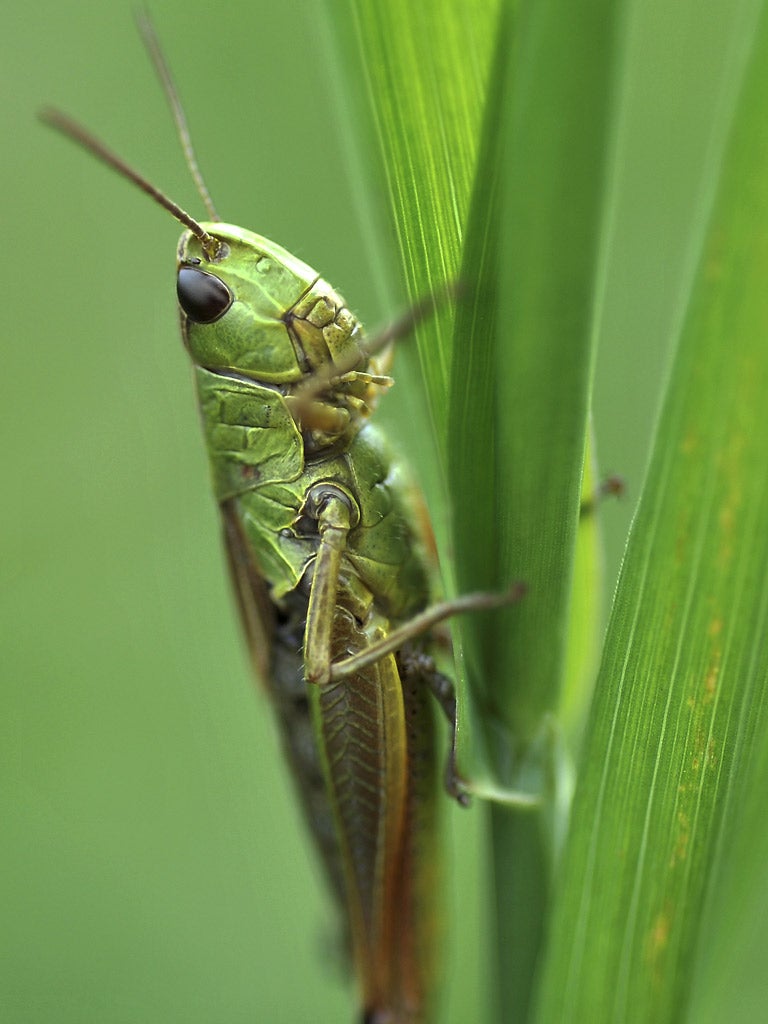Revealed: Insects change the way they communicate when drowned out by man-made noises

Birds and frogs do it, even whales have been known to do it. Now scientists have for the first time shown that insects also change the way they sing to one another when drowned out by man-made noises.
Click HERE to listen to a grasshopper battling traffic noise
Grasshoppers living next to a main road respond to the increased background volume of passing traffic by adjusting their summer courtship songs, scientists have discovered.
In order to make themselves heard above the low-rumble noise pollution of moving vehicles, male bow-winged grasshoppers of central Europe alter the pitch of their songs’ lower notes so that they rise to a mini-crescendo, the scientists found.
“Bow-winged grasshoppers produce songs that include low and high frequency components,” said Ulrike Lampe of the University of Bielefeld in Germany, who led the study published in the journal Functional Ecology.
“We found that grasshoppers from noisy habitats boost the volume of the lower-frequency part of their song, which makes sense since road noise can mask signals in this part of the frequency spectrum,” Dr Lampe said.
The effects of man-made noise on the sounds made by animals has been fairly well documented in vertebrates – creatures with a backbone – but has hardly been studied in the invertebrates such as insects, she said.
“We know that birds shift the frequencies of their songs or use songs with higher mean frequencies under noisy conditions. Some frog species alter their calling rate in response to high background noise levels,” Dr Lampe said.
Whales are also believed to alter their acoustic communications in response of the high-volume noises made by military submarines, ships and underwater explosions.
The bow-winged grasshopper, which is a common species in Central Europe, grows about 1.5cm long and varies in colour from green and brown to red and purple. They “sing” by rubbing a toothed file on their hind legs against the “bow” of a protruding vein in their front wings, rather like a cello.
In order to attract females during the months of July and September, adult males sing two second-long “phrases” to each song which increase in volume toward the end. Slow ticking sounds begin each phrase, which increase in speed and amplitude culminating in a buzzing sound towards the end.
Dr Lampe and her colleagues thought that the low-frequency region of the song might be masked by traffic noise which is why they decided to study the species.
“Bow-winged grasshoppers are a good model organism to study sexual selection because females can respond to male courtship songs with their own low-frequency acoustic signal, if they are attracted to a male song,” Dr Lampe said.
“Since males produce broadband signals with a maximum in the ultrasound region (above 30 kHz) and a smaller, but significant peak in the region between 6 and 10 kHz, we thought about the possibility that this lower part of the frequency spectrum might be degraded or masked by anthropogenic noise, such as traffic noise,” she explained.
The scientist collected 188 male bow-winged grasshoppers, half from next to a busy road and half from open grassland without any noise pollution, and compared the frequency range of their songs. They recorded nearly 1,000 different songs.
The traffic noise imposed on the urban grasshoppers could be having a serious effect on their ability to find suitable mates, Dr Lampe said.
“Increased noise levels could affect grasshopper courtship in several ways. It could prevent females from hearing male courtship songs properly, prevent females from recognising males of their own species, or impair females' ability to estimate how attractive a male is from his song,” she said.
“We don't know this, yet. We want to find out more about female preferences for spectral parameters of the songs and whether traffic noise affects these preferences in some way,” she added.
Join our commenting forum
Join thought-provoking conversations, follow other Independent readers and see their replies
Comments
Bookmark popover
Removed from bookmarks